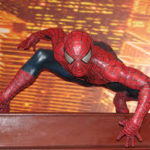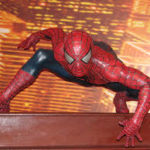
There’s no shortage of “poet’s workshop” books so, instead of buying new ones as they come out, I occasionally dip into old ones. After a few years between readings, the old becomes new, proving once again that the author of Ecclesiastes (“There is nothing new under the sun”) knew of what he spoke.
This week I’ve been poking around Steve Kowit’s In the Palm of Your Hand: The Poet’s Portable Workshop. Portable workshops are good things for a guy who’s never attended a real one (hand in the air). Cheaper, too.
One chapter that caught my eye was the one called “Flying Into Oneself.” In an earlier chapter, “Awful Poems,” Kowit cautions against “navel-gazing,” or self-indulgent writing that really interests only you and yourself. But in “Flying Into Oneself,” he assures us that the navel-point-of-view can still work IF it takes its lint and weaves a creative cloak.
Ordinary (your world), meet surreal (an “out there” world), in other words.
As an example, and we all love examples, Kowit gives us David Ignatow’s poem “The Bagel.” You don’t get much more prosaic than a bagel. Ho-hum and pass the cream cheese. But Ignatow takes his self-indulgent, perhaps daily ritual of bagel-eating and takes it places the reader would not expect. Suddenly, self-indulgence gets off with a warning because reading police officers are intrigued by events. Witness:
“The Bagel” by David Ignatow
I stopped to pick up the bagel
rolling away in the wind,
annoyed with myself
for having dropped it
as if it were a portent.
Faster and faster it rolled,
with me running after it
bent low, gritting my teeth,
and I found myself doubled over
and rolling down the street
head over heels, one complete somersault
after another like a bagel
and strangely happy with myself.
If the prompt were to write a poem about dropping a bagel and a classroom of workshop students went to work, the results would be rather crumby. Yeah, you’d have variations on a theme: cream cheese, butter, jam, even lox, but overall, it wouldn’t get much further than the 5-second rule.
Ignatow’s example can be liberating for writers who think they lack for novel subjects. If you feel stymied by the quotidian obstinacy of everyday life, consider breathing new life into the ordinary. For starters, don’t restrict yourself. Forget the laws of physics. You’re not Isaac Newton. You’re a poet. If you want to have fun by somersaulting like a bagel chasing a bagel, be my guest. Readers will be happy to laugh at you, be charmed by you, cheer you, even.
Kowit sees some parallels between thinking like this and using dream imagery, but you don’t need a dream journal on your bedside table to engage. Day dreaming is much easier. And escapism via fanciful notions may just be the charge your “so what?” topics need.
Give it a go. Is it self-indulgent and ordinary? The answer’s no. It all depends upon the angle (and the spin)…









